Nasal Congestion
Nasal congestion treatments are remedies specifically formulated to alleviate the symptoms of a blocked or stuffy nose caused by colds, flus, allergies, or sinusitis. This category includes a range of products, from saline solutions that help moisturise and flush out nasal passages to medicated sprays that reduce swelling and inflammation. Read More…

-
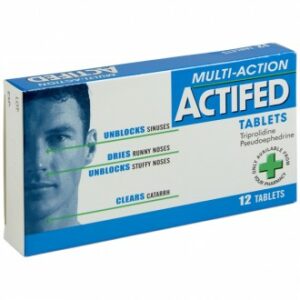
Actifed Multi-Action Tablets (12 Tablets)
- Relieves Blocked Noses And Sinuses
- Clears Catarrh
- Active Ingredients: Pseudoephedrine Hydrochloride And Triprolidine Hydrochloride
£4.49 Select options -
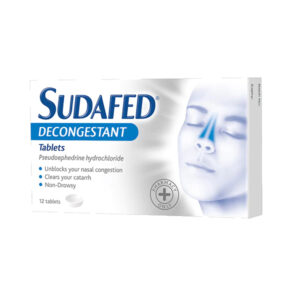
Sudafed Non Drowsy Decongestant Tablets
- Non-Drowsy Nose And Sinus Decongestant
- Active Ingredient: Pseudoephedrine Hydrochloride
- Clears Catarrh
£5.69 Select options -
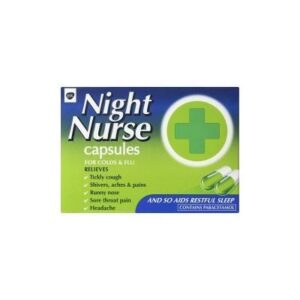
Night Nurse Cold And Flu Capsules – 10 Capsules
- Relieves Cold And Flu Symptoms
- Active Ingredients: Paracetamol, Pseudoephedrine Hydrochloride, Pholcodine, Promethazine Hydrochloride And Dextromethorphan Hydrobromide
- For 24 Hour Relief
£7.79 Select options -
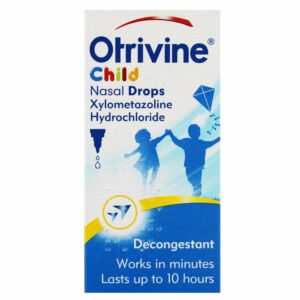
Otrivine Child Nasal Drops – 10ml
- Active Ingredients: Xylometazoline
- Relieves Nasal Congestion
- Buy With Confidence From UK Registered Pharmacy
£4.29 Select options -
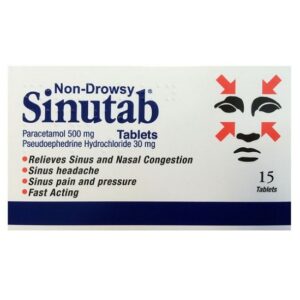
Sinutab Non-Drowsy Tablets
- Relieves Sinus Congestion, Headache And Pain
- Non-Drowsy
- Active Ingredients: Pseudoephedrine Hydrochloride And Paracetamol
£7.19 Select options -
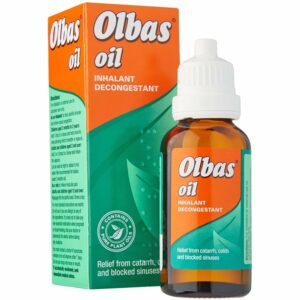
Olbas Oil Inhalant Decongestant 30ml
- Relieves Catarrh, Colds And Blocked Sinuses
- Active Ingredients: Pure Plant Oils
- Non-Greasy
£6.49 Select options -
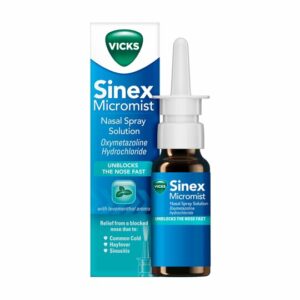
Vicks Sinex Micromist Spray 15ml
- Relieves A Blocked Nose
- Active Ingredients: Oxymetazoline hydrochloride
- Lasts For 6-8 Hours
£5.09 Select options -
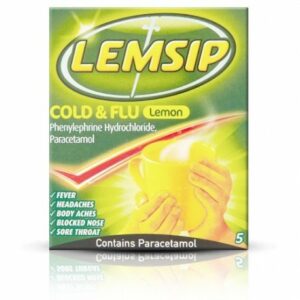
Lemsip Cold & Flu Lemon Flavour Sachets (5)
- Relieves Cold And Flu Symptoms
- Active Ingredients: Paracetamol And Phenylephrine Hydrochloride
- Stir Into Hot Water, Then Drink
£5.19 Select options -
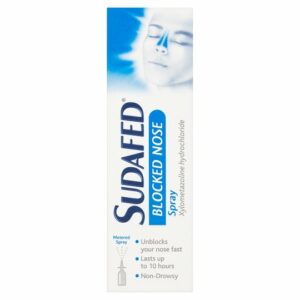
Sudafed Blocked Nose Spray 15ml
- Relieves Blocked Nose And Sinuses
- Active Ingredient: Xylometazoline Hydrochloride
- Non-Drowsy
£4.79 Select options -
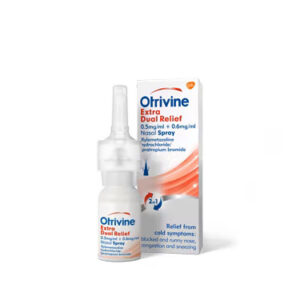
Otrivine Extra Dual Relief Nasal Spray – 10ml
- Active Ingredients: Ipratropium / xylometazoline
- Relieves Nasal Congestion
- Buy With Confidence From UK Registered Pharmacy
£9.19 Add to basket -
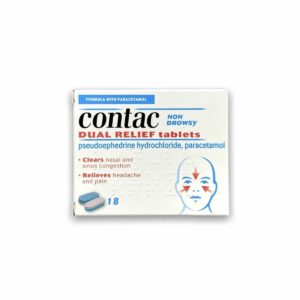
Contac Dual Relief Non-Drowsy – 18 Tablets
- Effective Nasal Congestion Relief
- Active Ingredients: Paracetamol & Pseudoephedrine
- Buy With Confidence From UK Registered Pharmacy
£7.69 Select options -
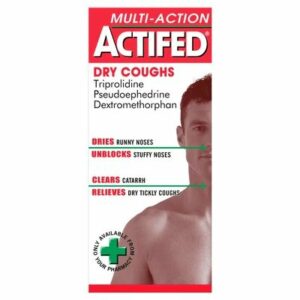
Actifed Dry Coughs Liquid – 100ml
- Active ingredients : Triprolidine, Pseudoephedrine & Dextromethorphan
- Helps Relieve Dry Coughs & Symptoms Related To Congestion
- Next Day Delivery Option Available At Checkout
£6.59 Select options -
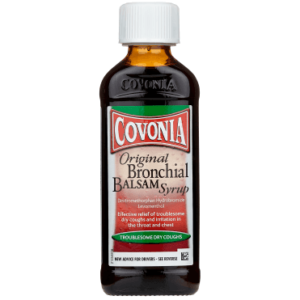
Covonia Original Bronchial Balsam Syrup – 150ml
- Active Ingredients: Dextromethorphan & Menthol
- Relieves a Dry Cough
- Buy With Confidence From UK Registered Pharmacy
£5.29 Add to basket -
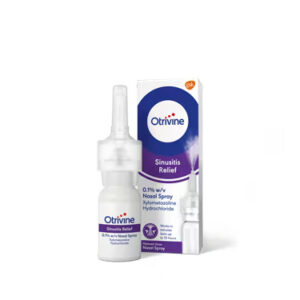
Otrivine Sinusitis Nasal Spray – 10ml
- Effective Relief of Sinusitis
- Active Ingredients:xylometazoline
- Buy With Confidence From UK Registered Pharmacy
£6.49 Select options -
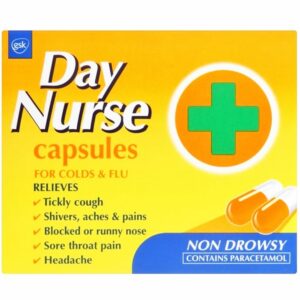
Day Nurse Capsules – 20 Capsules
- Relieves Cold And Flu Symptoms
- Active Ingredients: Paracetamol / Pseudoephedrine / Pholcodine
- For 24 Hour Relief
£10.49 Select options -
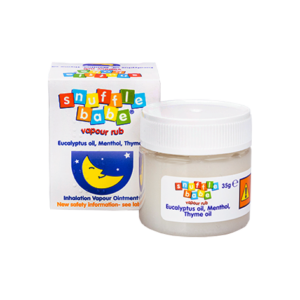
Snufflebabe Vapour Rub 35g
- Relieves Congested Children And Babies
- Active Ingredient: Eucalyptus Oil, Menthol And Thyme Oil
- Makes Sleeping And Feeding Easier
£3.45 Select options -
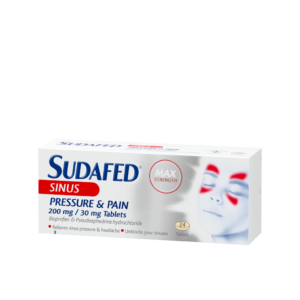
Sudafed Sinus Pressure & Pain 200mg/30mg Tablets
- Active ingredients: Ibuprofen & Pseudoephedrine
- Relieves sinus pain and congestion
- Tablets instead of nasal spray
£5.39 – £8.89 Select options -
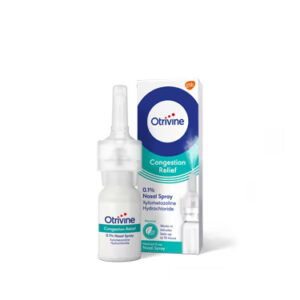
Otrivine Congestion Relief Nasal Spray – 10ml
- Starts unblocking the nasal airways within 2 minutes
- Congestion relief
- Fresh menthol sensation
£5.19 Add to basket -
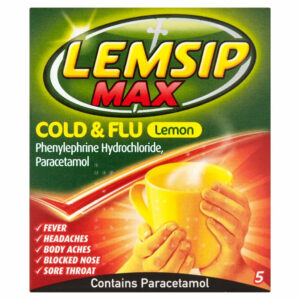
Lemsip Max Lemon Sachets – 5 Sachets
- Helps Fever, Blocked Nose, Sore Throat & Pain
- Active Ingredients : Phenylephrine & Paracetamol
- Buy With Confidence From UK Registered Pharmacy
£5.89 Select options -
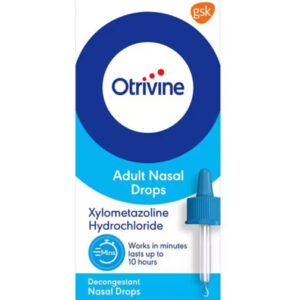
Otrivine Adult Nasal Drops – 10ml
- For congested individuals over 12 years old who favour a drop format
- Starts unblocking the nasal airways within 2 minutes
- Active ingredient: Xylometazoline hydrochloride 0.1%
£3.49 Add to basket -
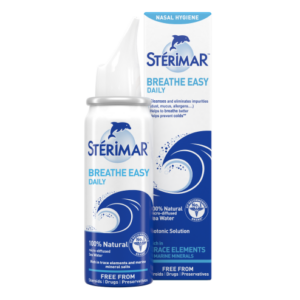
Sterimar Breathe Easy Daily – 100ml
- 100% micro-diffused sea water
- Rich in trace elements and marine mineral salts
- Drug, preservative & steroid free
£6.65 Add to basket -
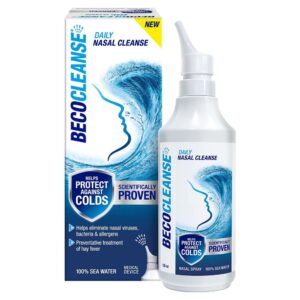
Becocleanse Isotonic Jet Nasal Cleanse – 135ml
- Helps eliminate nasal viruses, bacteria & allergies
- Preventative treatment of hay fever
- 100% sea water
£6.49 Read more -
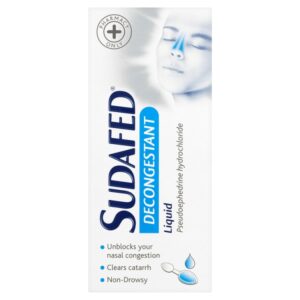
Sudafed Decongestant Liquid 100ml
- Active Ingredient: Pseudoephedrine Hydrochloride
- Provides Relief From Congested Nasal Passages and Sinuses
- Buy With Confidence From UK Registered Pharmacy
£5.79 Select options -
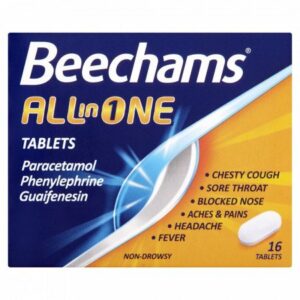
Beechams All In One Tablets – 16 Tablets
- Relieves Cold And Flu Symptoms
- Active Ingredients: Paracetamol, Guaifenesin And Phenylephrine Hydrochloride
- Non-Drowsy
£5.89 Select options -
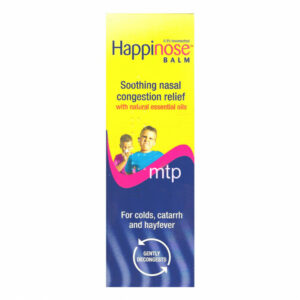
Happinose Nasal Decongestant Balm 14g
- Soothing Nasal Congestion Relief
- Active Ingredients: Levomenthol
- Buy With Confidence From UK Registered Pharmacy
£5.39 Add to basket -
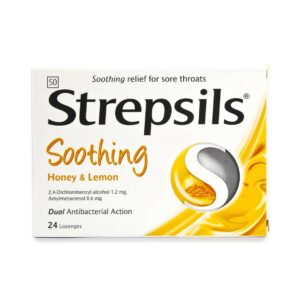
Strepsils Soothing Honey and Lemon Lozenges – 24 Lozenges
- Effective Sore Throat Relief
- Active Ingredients: Dichlorobenzyl Alcohol And Amylmetacresol
- Take Every 2-3 Hours
£6.39 Select options -
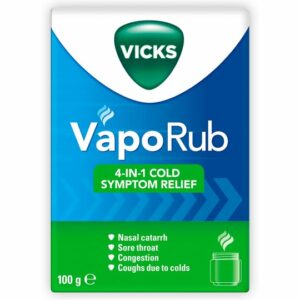
Vicks VapoRub 4-in-1 Cold Symptom Relief
- Effective Congestion Relief
- Buy With Confidence From UK Registered Pharmacy
- Next Day Delivery Available
£4.49 – £7.09 Select options -
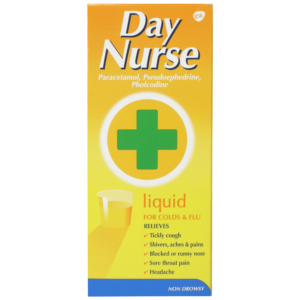
Day Nurse Liquid (240ml)
- Liquid For Colds & Flu
- Active Indredients: Paracetamol Pseudoephedrine & Pholcodine
- Buy With Confidence From UK Resgistered Pharmacy
£10.79 Select options -
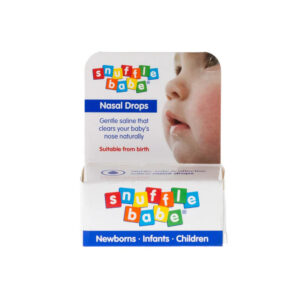
Snufflebabe Nasal Drops 10ml
- Gentle Saline Solution That Clears Your Baby’s Nose Naturally
- Suitable From Birth
- Buy With Confidence From UK Registered Pharmacy
£3.89 Add to basket -
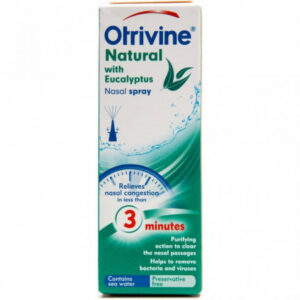
Otrivine Natural Nasal Spray – 20ml
- Relieves A Blocked Nose
- Active Ingredients: Oxymetazoline Hydrochloride
- Lasts Up To 10 Hours
£7.79 Select options -
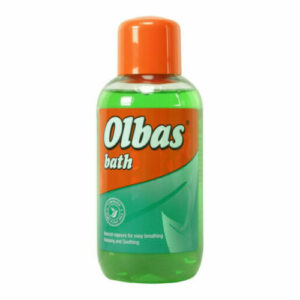
Olbas Bath Oil 250ml
- For Relaxation & Congestion Relief
- Buy With Confidence From UK Registered Pharmacy
- Next Day Delivery Available
£4.89 Add to basket -

Otrivine Adult Nasal Spray – 10ml
- Starts unblocking the nasal airways within 2 minutes
- Congestion relief
- Active ingredient: Xylometazoline hydrochloride 0.1%
£4.29 Add to basket -
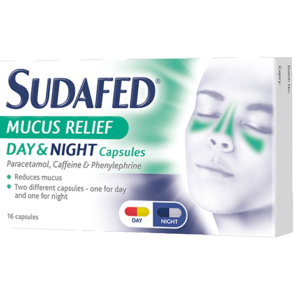
Sudafed Mucus Relief Day & Night Capsules – 16 Capsules
- Active Ingredients Paracetamol, Caffeine and Phenylephrine
- Both Daytime & Nighttime Relief
- Buy With Confidence From UK Registered Pharmacy
£6.29 Select options -
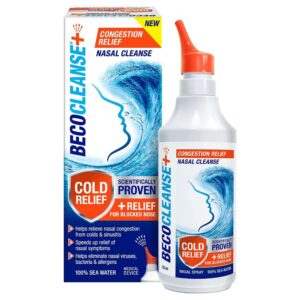
Becocleanse Plus Hypertonic Nasal Spray – 135ml
- Helps relieve nasal congestion from colds & sinusitis
- Speeds up relief of nasal symptoms
- Helps eliminate nasal viruses, bacteria & allergies
£8.09 Read more -
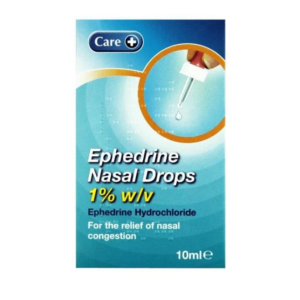
Ephedrine Nasal Drops 1% 10ml
- Effective Relief For Nasal Congestion
- Active Ingredients:Ephedrine
- Buy With Confidence From UK Registered Pharmacy
£4.49 Select options -
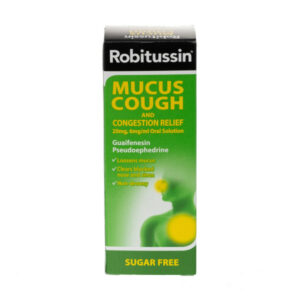
Robitussin Mucus Cough & Congestion Relief – 100ml
- Effective Relief For Mucus and Congestion
- Active Ingredients: guaifenesin and pseudoephedrine
- Buy With Confidence From UK Registered Pharmacy
£5.09 Select options -
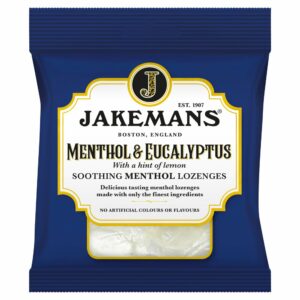
Jakemans Extra Strong Sweets Menthol & Eucalyptus 73g
- Soothing Vapour Action
- No Artificial Colours/Flavours
- Made With Only The Finest Ingredients
£1.79 Read more -

Sterimar Breathe Easy Daily – 50ml
- 100% micro-diffused sea water
- Rich in trace elements and marine mineral salts
- Drug, preservative & steroid free
£4.19 Add to basket -
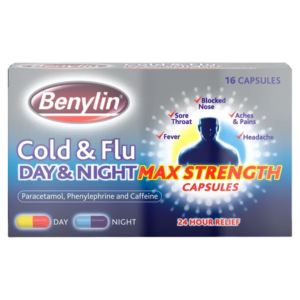
Benylin Cold & Flu Day & Night Max Strength Capsules (16)
- Eases Headaches
- Unblocks Airways
- Reduces Tiredness
£6.79 Select options -
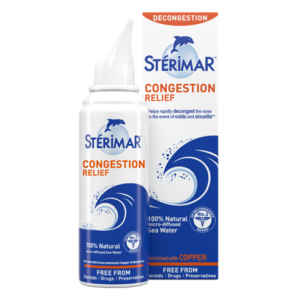
Sterimar Congestion Relief – 100ml
- Helps rapidly decongest the nose in the event of colds and sinusitis
- Enriched with copper
- Free from steroids, drugs and preservatives
£7.39 Add to basket -
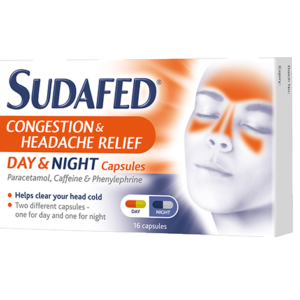
Sudafed Congestion & Headache Relief Day & Night Capsules – 16 Capsules
- Congestion & Headache Relief
- Active Ingredients: Paracetamol /Caffeine /Phenylephrine
- Next Day Delivery Available
£6.49 Add to basket -
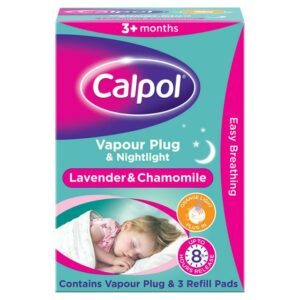
Calpol Vapour Plug & Nightlight + 3 Refills
- INCLUDES 3 REFILL PADS
- Contains : Lavender & Chamomile
- Quickly Relieves A Blocked Nose
£9.29 Add to basket -
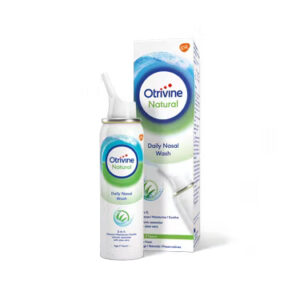
Otrivine Natural Daily Nasal Wash – 100ml
- Cleanses the nasal airways naturally
- Washes away excess mucus or dust & pollen
- Makes breathing easier compared with no treatment
£7.99 Add to basket -
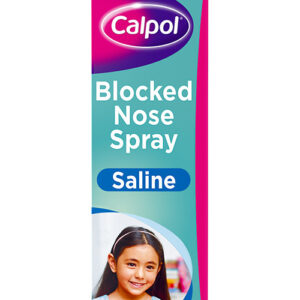
Calpol Blocked Nose Spray 15ml
- Suitable For Adults & Children Over 3 Years
- Quickly Relieves A Blocked Nose
- Buy With Confidence From UK Registered Pharmacy
£4.99 Add to basket -

NeilMed Sinus Rinse Kit Premixed Sachets – 120 Sachets
- Natural Sinus Relief Treatment
- Active Ingredients: Sodium Chloride And Sodium Bicarbonate
- Buy With Confidence From UK Registered Pharmacy
£20.49 Select options -

Beechams All In One Liquid 160ml
- Effective Relief For Chesty Coughs
- Active Ingredients: paracetamol / phenylephrine / guaifenesin
- Buy With Confidence From UK Registered Pharmacy
£6.39 Select options -

Sterimar Congestion Relief – 50ml
- Helps rapidly decongest the nose in the event of colds and sinusitis
- Enriched with copper
- Free from steroids, drugs and preservatives
£4.99 Add to basket -
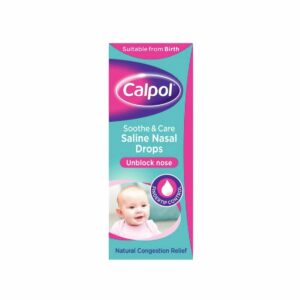
Calpol Soothe & Care Saline Nasal Drops – 10ml
- Suitable For Adults & Children Over 3 Years
- Quickly Relieves A Blocked Nose
- Buy With Confidence From UK Registered Pharmacy
£6.39 Add to basket -
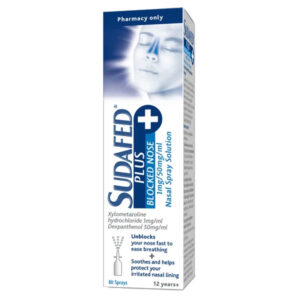
Sudafed Plus Blocked Nose Nasal Spray – 10ml
- Unblocks your nose fast to ease breathing
- Soothes and helps protect your irritated nasal lining
- Contains Xylometazoline & Dexpanthenol
£6.49 Select options -
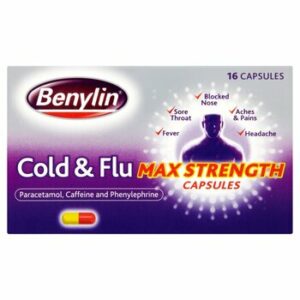
Benylin Cold & Flu Max Strength – 16 Capsules
- Eases Headaches
- Unblocks Airways
- Reduces Tiredness
£6.49 Select options -
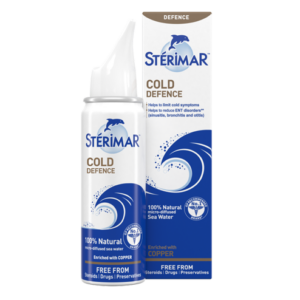
Sterimar Cold Defence – 50ml
- Helps to limit cold symptoms
- 100% natural micro-diffused sea water
- Enriched with copper
£5.94 Add to basket -
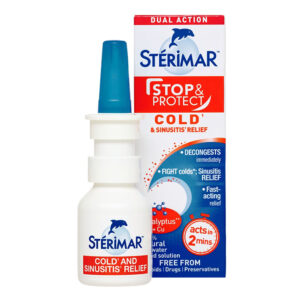
Sterimar Stop & Protect Cold & Sinusitis – 20ml
- Decongests immediately
- Fight colds, sinusitis relief
- Fast acting relief, acts in 2 minutes
£9.49 Add to basket -
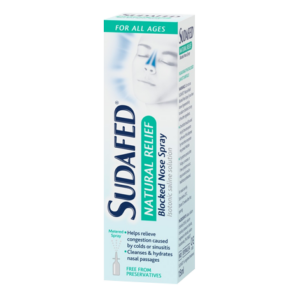
Sudafed Natural Relief Blocked Nose Spray – 15ml
- Helps relieve congestion caused by colds or sinusitis
- Cleanses and hydrates nasal passages
- Preservative free
£5.99 Add to basket -
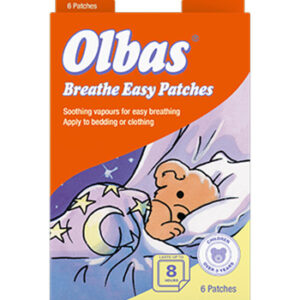
Olbas Breathe Easy Patches – 6 Patches
- Soothing vapours for easy breathing
- Apply to bedding or clothing
- Lasts for up to 8 hours
£7.49 Add to basket -
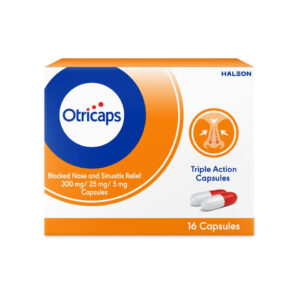
Otricaps Blocked Nose and Sinusitis Relief Capsules – 16 Capsules
- Non-drowsy, triple action capsules
- Contains Paracetamol, Caffeine and Phenylephrine Hydrochloride
- Provides relief for headache, fever, sore throat, sinusitis and more
£4.09 Add to basket
-
About the Condition: Nasal Congestion
Nasal congestion, commonly known as a blocked or stuffy nose, is a frequent health issue that can significantly impact daily life. It occurs when the nasal passages become swollen and inflamed, leading to a sensation of fullness and discomfort. Various factors can cause nasal congestion, including colds, flu, allergies, and sinusitis. Treatments for nasal congestion aim to alleviate these symptoms and restore normal breathing. They range from simple home remedies, such as staying hydrated and using a humidifier, to over-the-counter (OTC) medications like nasal decongestant sprays and oral antihistamines. In more severe cases, prescription medications or even surgical interventions may be necessary. It’s essential to understand the underlying cause of congestion to choose the most effective treatment.
-
Symptoms of Nasal Congestion
Nasal congestion is characterised by a variety of symptoms that can range from mild to severe, depending on the underlying cause. Common symptoms include:
Blocked Nasal Passages: The most prominent symptom, where the nose feels clogged, making it difficult to breathe through the nostrils.
Reduced Sense of Smell and Taste: Swelling in the nasal passages can lead to a diminished ability to smell and taste.
Pressure and Pain: Congestion often causes a feeling of pressure or fullness in the face, particularly around the sinuses, which can lead to headaches or facial pain.
Snoring and Sleep Disturbances: A blocked nose can result in snoring or difficulty sleeping, leading to fatigue and irritability.
Mucus Build up: Increased production of mucus, which can be clear, yellow, or green, is common and may lead to post-nasal drip, coughing, or throat irritation.
Difficulty Speaking: Congestion can affect the resonance of the voice, making it sound nasal or muffled.
It’s important to note that these symptoms can also be accompanied by other signs of illness, such as fever, sore throat, or cough, especially if the congestion is due to a cold or flu. If symptoms persist or worsen, it’s advisable to seek medical advice for proper diagnosis and treatment.
-
Diagnosis of Nasal Congestion
Diagnosing nasal congestion typically involves a combination of medical history evaluation, physical examination, and, if necessary, further diagnostic tests. Here’s how the process usually unfolds:
Medical History: The doctor will start by asking about the patient’s symptoms, their duration, and any potential triggers such as exposure to allergens, recent colds, or sinus infections. Information about any underlying health conditions, such as asthma or allergies, is also crucial.
Physical Examination: The healthcare provider will examine the nose and surrounding areas. They may use a tool called a nasal speculum to look inside the nasal passages and check for signs of inflammation, polyps, or other abnormalities.
Allergy Testing: If allergies are suspected as the cause of congestion, skin prick tests or blood tests may be conducted to identify specific allergens.
Imaging Tests: In cases of chronic congestion or suspected sinusitis, imaging tests like X-rays, CT scans, or MRI scans may be recommended to get a detailed view of the sinuses and nasal passages.
Endoscopy: A nasal endoscopy, which involves inserting a thin, flexible tube with a camera into the nasal passages, can help the doctor get a closer look at the sinuses and detect any issues.
Mucus Culture: Sometimes, a sample of mucus may be taken and tested to determine if a bacterial infection is causing the congestion.
Based on the findings from these assessments, the doctor can determine the underlying cause of the nasal congestion and recommend an appropriate treatment plan.
-
Treatment
The treatment for nasal congestion varies depending on the underlying cause and the severity of the symptoms. At My Pharmacy, we offer a variety of options to help alleviate congestion:
- Decongestant Sprays: Products like Sudafed Blocked Nose Spray and Otrivine Adult Nasal Spray work by reducing swelling in the nasal passages, allowing for easier breathing.
- Oral Decongestants: Tablets such as Actifed Multi-Action and Sudafed Non-Drowsy Decongestant Tablets can provide relief from congestion and associated symptoms like headache and sinus pressure.
- Inhalants and Rubs: Olbas Oil Inhalant Decongestant and Vicks VapoRub offer soothing vapours that can help clear the airways and ease breathing.
- Saline Solutions: Options like Sterimar Breathe Easy Daily and Otrivine Natural Nasal Spray are gentle and effective for daily use, helping to cleanse and moisturise nasal passages.
In addition to these treatments, staying hydrated, using a humidifier, and practising good nasal hygiene can also help manage symptoms. It’s important to consult with a healthcare professional to determine the most appropriate treatment for your specific needs.
-
Prevention Strategies
To help prevent nasal congestion, consider the following tips:
Stay Hydrated: Drink plenty of fluids to keep your nasal passages moist.
Use a Humidifier: Adding moisture to the air can help prevent dryness in your nasal passages.
Practise Good Hygiene: Wash your hands regularly to avoid catching colds or flu.
Manage Allergies: Keep your living environment free of allergens and use air filters to reduce airborne irritants.
Avoid Irritants: Steer clear of smoke, strong perfumes, and other irritants that can trigger congestion.
Nasal Rinses: Consider using saline nasal sprays or neti pots to flush out your nasal passages.By incorporating these habits into your routine, you can reduce the likelihood of experiencing nasal congestion.












